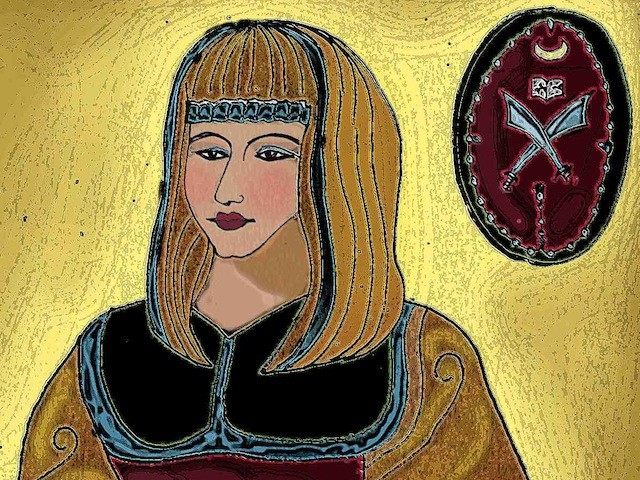Jezebel contributor Laura Sook Duncombe has discovered a “Cinderella story of unusual satisfaction” in a sixteenth-century female Muslim piracy organizer. Writing for the feminist blog Jezebel, Duncombe’s Orientalist fantasy “of an independent and beautiful woman” in Morocco who terrorized non-Muslims shows how deluded and self-hating Western political correctness has become.
Duncombe recounts the life of the “last Islamic queen,” a woman only known to history by her title Sayyida al-Hurra. As the Moroccan historian Fatema Mernissi explains in her book The Forgotten Queens of Islam, al-hurra means “free woman” in Arabic while sayyid/sayyida mean “master, lord”– or, in modern usage, Mr./Mrs. Al-Hurra was born in Granada in 1485 but had to flee with her family to Morocco in 1492 when Christian forces completed their Reconquista of the Iberian peninsula and overthrow Muslim rule established by invaders centuries earlier.
Duncombe notes that Al-Hurra married “Abu al-Hasan al-Mandri, a man many years her senior to whom she’d been promised to as a child” and ruler of the town of Tetouán. As others have elaborated, al-Hurra was 16 and al-Mandri 30 years older when they entered a marriage that at least does not shock modern sensibilities like the child marriages existing throughout Islamic history. Unmentioned in Duncombe’s tale of al-Hurra’s “life full of adventure and romance,” al-Mandri could have theoretically consummated his marriage when al-Hurra was nine. Islam’s Muhammad, whose biography has a canonical status, consummated in his mid-50s a marriage with a nine-year-old, Aisha. Al-Hurra is also cryptically referred to as al-Mandri’s “chief wife,” raising the possibility that she was not his only companion under Islamic laws of polygamy and concubines.
Upon al-Mandri’s death in 1515, Mernissi describes prosaically, al-Hurra became “Hakima Tatwan (governor of Tetouán). Tetouán “accepted her as governor without demur,” Mernissi explains, because al-Hurra’s “husband decidedly older than herself… lost his sight at the end of his life.” This led to the “precocious involvement of his wife in political affairs” and the “community grew accustomed to seeing her exercise authority.” (In an alternative theory left open by scant historical records, al-Hurra married not al-Mandri senior, but his son al-Mandri II, who recognized his wife’s abilities and left her in charge during his travels.)
In subsequent years, al-Hurra developed Tetouán into a leading Muslim pirate base, continuing in a centuries-old tradition that had long scourged the Mediterranean’s non-Muslim communities. Al-Hurra’s depredations appear as righteous revenge for expulsion from Granada during a woman’s “transformation from refugee to Queen” in Duncombe’s overactive imagination. “I can picture her as a tiny child, face streaked with tears, watching the lights of her home fade away from the deck of a ship, promising to herself to make those who had taken her life from her pay.” Al-Hurra and other Andalusian exiles “could never shake off the feelings of shame and fear” for losing “their Granadan homeland” and therefore a “desire for revenge” led to a “holy war against the Catholics.”
Yet historical facts belie Duncombe’s narrative of aggrieved Muslims retaliating. Mernissi recounts how al-Hurra’s family and other Andalusian Muslims “decided to return to North Africa after the fall of Granada.” Arab Muslims, after all, were not originally indigenous to the Iberian Peninsula or North Africa, for that matter, but took root there as a result of jihad conquests. Mernissi writes that al-Hurra “found no better way to ease the humiliation of defeat than… piracy.” Islamic doctrine overlooked by Duncombe has historically justified such aggressive Islamic holy war on land or at sea in the form of piracy without any prior grievance.
Duncombe rejoices strangely in al-Hurra’s “ruthless pirate fleet” that dominated the western Mediterranean, once raiding Gibraltar, and took captives for either enslavement or ransoming, including the Portuguese governor’s wife. “Hostage negotiations went through” al-Hurra, “everything having to do with piracy went through her.” The “money she stole from Catholic coffers… revitalized her new hometown” Tetouán and compensated property lost in Granada; “everyone was benefiting from her labors.”
Mernissi, upon whom Duncombe and others rely for their knowledge of al-Hurra, analyzes how her name indicated Muslim society’s stark inequality. Al-hurra “described the legal wife, often of aristocratic descent, as opposed to the jarya, who was bought by the master on the slave market.” “Hurr in Arabic has no democratic or popular connotation,” but “is what distinguishes a person from being a slave, from being inferior,” a “concept intrinsically linked to sharaf, the aristocracy.”
A “sparsely documented” historical record leaves Duncombe and others with little knowledge of Al-Hurra’s end. Most likely the stepson of Duncombe’s “beloved Queen and fierce pirate” from her second marriage to Morocco’s king deposed her in 1542, and “after that, she disappears from history altogether.” Muslim female political leaders throughout history, Mernissi observes, were often “poisoned or stabbed. Rare were those who died peacefully in their beds.” Muslim historians often pass over these women with “disdainful silence.”
Notwithstanding her rejection of “holy wars and revenge vendettas,” Duncombe finds bizarrely in Al-Hurra “virtues valuable to all women” counteracting “dangerously prejudicial” modern images of the “Muslim woman.” While President Barack Obama has inaccurately condemned the Crusaders as mere criminals and warned against a Christian “high horse,” his follower Duncombe lauds a female predecessor of modern jihadists, both male and female. Duncombe and Obama’s historical understanding of Islam would be funny if it were not so serious.

COMMENTS
Please let us know if you're having issues with commenting.